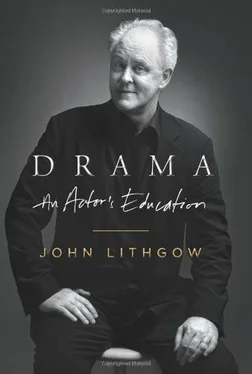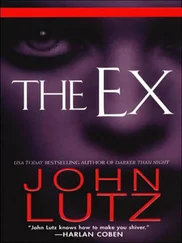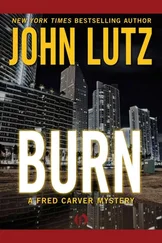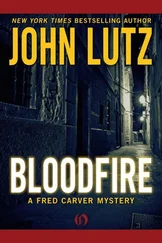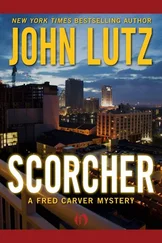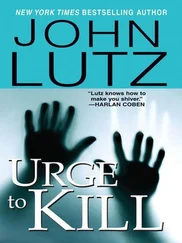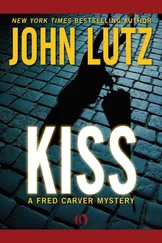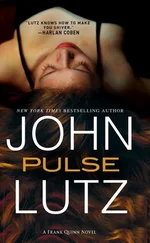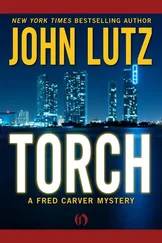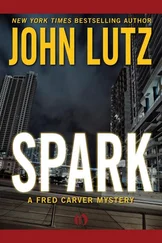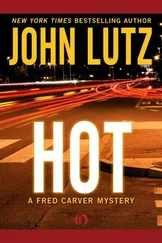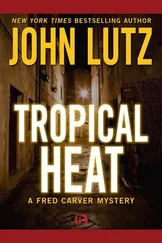John Lithgow - Drama - An Actor's Education
Здесь есть возможность читать онлайн «John Lithgow - Drama - An Actor's Education» весь текст электронной книги совершенно бесплатно (целиком полную версию без сокращений). В некоторых случаях можно слушать аудио, скачать через торрент в формате fb2 и присутствует краткое содержание. Год выпуска: 2011, ISBN: 2011, Издательство: Harper, Жанр: Биографии и Мемуары, на английском языке. Описание произведения, (предисловие) а так же отзывы посетителей доступны на портале библиотеки ЛибКат.
- Название:Drama: An Actor's Education
- Автор:
- Издательство:Harper
- Жанр:
- Год:2011
- ISBN:9780061734977
- Рейтинг книги:4 / 5. Голосов: 1
-
Избранное:Добавить в избранное
- Отзывы:
-
Ваша оценка:
- 80
- 1
- 2
- 3
- 4
- 5
Drama: An Actor's Education: краткое содержание, описание и аннотация
Предлагаем к чтению аннотацию, описание, краткое содержание или предисловие (зависит от того, что написал сам автор книги «Drama: An Actor's Education»). Если вы не нашли необходимую информацию о книге — напишите в комментариях, мы постараемся отыскать её.
Drama: An Actor's Education — читать онлайн бесплатно полную книгу (весь текст) целиком
Ниже представлен текст книги, разбитый по страницам. Система сохранения места последней прочитанной страницы, позволяет с удобством читать онлайн бесплатно книгу «Drama: An Actor's Education», без необходимости каждый раз заново искать на чём Вы остановились. Поставьте закладку, и сможете в любой момент перейти на страницу, на которой закончили чтение.
Интервал:
Закладка:

Courtesy Yellow Springs News .
The next day, on the afternoon of our opening night, I walked into the company’s big communal dressing room, eagerly searching for my costume. I was shattered by what I found. At the dress rehearsal, the leotard had been judged to be too bright under the stage lights, so it had been unceremoniously splattered with black paint to cut down the glare. This was bad enough. But the fate of my glorious hat was even worse. “Too showy,” the director had decided. Just like the leotard, the hat had been splattered with black paint. And to my even greater horror, it had been cut down to half its size! “What is it,” I must have wondered, “about me and hats ?”
The woman who designed my androgynous Mustardseed getup also designed every other costume that summer. Of everyone who worked at the festival in all those years, she has emerged as perhaps the greatest star. She is the Oscar-winning costumer Ann Roth, who designed the clothes for The English Patient, The Birdcage , and over a hundred other plays and films. In 1981, we had occasion to work together again. She designed my entire wardrobe for the role of the transsexual Roberta Muldoon in The World According to Garp . In one of my last appearances in the film, you may remember that I am wearing a stunning, broad-brimmed black hat.
Standing onstage at age seven in my first scene in A Midsummer Night’s Dream is one of the most potent memories of my childhood. Oberon and Titania, the king and queen of the fairies, are quarreling over a mortal “changeling boy.” In essence, it is a Shakespearean take on a hostile child-custody case. Poetry pours forth from both characters as Shakespeare seems to swoon at the chance to write dialogue for fairy royalty. And there I stood, half-forgetting that I was in a play, drinking it all in — the moonlit night, the pungent summer air, the cool breeze, the warm glow of stage lights, the distant shriek of cicadas, and the mysterious, half-lit faces of the audience, hanging on every word.
And such words! They washed over me in waves, unamplified and gorgeously spoken, especially in the honeyed baritone of Earle Hyman as Oberon. At age seven, I barely knew what any of those phrases meant, but their sheer beauty enthralled me. Years later, in my mid-teens, my father took me to a matinee of a touring production of A Midsummer Night’s Dream at the Hanna Theatre in Cleveland. He had a couple of old friends in the cast, so for him it was an obligatory visit. But for me it was an afternoon of intense discovery.
I hadn’t seen the play since that summer when I played Mustardseed. On this day in Cleveland, as I watched all of the fairy scenes, I was transported back to my childhood. I listened to every line as if it were half-remembered music. But this time, there was a kind of electric shock of recognition as I connected with Shakespeare’s language. This time I knew what they were saying ! I suddenly understood the chemical reaction between poetry and emotion, acted out onstage. My excitement was so keen that it almost matched the thrill of witnessing one of the greatest comic performances I had ever seen, or have seen since. In the role of Bottom the Weaver, I got to see Bert Lahr.
Oh yes, Shakespeare could make you laugh. Nobody knew that better than Bert Lahr. I once mentioned to his son, New Yorker critic John Lahr, that I’d seen his father play Bottom in A Midsummer Night’s Dream . John told me that Bert had wanted to do the role for a very simple reason. Bottom draws a sword in the comic play-within-a-play toward the end of Act V. Bert had seen this as an opportunity to have his pants accidentally fall down around his ankles. This was comedy gold for an old vaudevillian. And I saw it happen! Bert Lahr drew his sword, his pants fell down, and the audience laughed for about five minutes. Eventually everyone onstage laughed, too. From the audience, I noticed Lahr mutter something to the other actors. They laughed even harder. After the show, I asked one of those actors what Lahr had said to them, in the midst of that torrent of laughter from the crowd. He’d said, “Let’s wear them out.”
It wasn’t the first time I’d seen an antic character stop the show in a Shakespeare comedy. I can still picture so many moments of hilarity that I watched from my seat at the Antioch Festival. I see Petruchio waging a food fight, Sir Andrew Aguecheek waggling his sword, Dogberry cavorting with his night watchmen, like so many Keystone Kops. And I see my father, in my favorite of all his roles, staggering around as the drunken butler Stefano in The Tempest . These riotous performances represent my first lessons in the vulgar art of making people laugh.
One summer during those years, when I was twelve years old, I had the chance to put those lessons to work. The occasion was the big show on the last night of a week of Boy Scout camp, with hundreds of raucous boys in attendance. Our troop had been chosen to put on a skit. We had come up with a ten-minute version of the old melodrama involving a hero, a villain, and a damsel-in-distress tied to the railroad tracks. I must have been either the most accommodating or the most spineless Scout in camp, because I had ended up in the role of the damsel-in-distress.
That afternoon we haphazardly rehearsed for about fifteen minutes, then decided that in the evening we would just wing it. At showtime, I awaited my entrance in the darkness in my improvised costume. I wore a checkered tablecloth for a skirt and a Scout bandana for a headscarf. Combat boots completed the picture. The rustling sound of the crowd filled me with terror. I was a quivering bundle of nerves, anticipating the most mortifying humiliation imaginable. But alas, there was no turning back.
My cue arrived, I made my entrance, and I threw myself into the scene. I must have been emboldened by the memory of all those Shakespearean histrionics back at the festival. Whatever I drew on, it worked. The crowd of boys greeted my every fey line and my every mincing gesture with gales of laughter, hooting their approval. The hero, played by Eagle Scout Larry Fogg, untied me from the tracks, hoisted me into his arms, and fell backwards onto his butt with me on top of him. The laughter was earsplitting. It filled me with joy. Like Bert Lahr, we wore them out.
For a week, I had been a shy, despondent, homesick camper. As of that night, I was a Scout Camp star. If you hear enough applause and laughter at a young enough age, you are doomed to become an actor. After my performance as the damsel-in-distress, my fate was probably sealed.
The irony is that I had no intention of being an actor. Oh, I loved the energy and excitement of theater, I adored the Festival’s plays and players, and nothing matched the giddy sensation of actually being onstage. But I never thought of any of this as anything more than a summertime diversion. I had another, altogether different, calling. I wanted to be an artist.
Early on, I felt myself in possession of an innate talent and facility for drawing and painting. In those early years, I would gravely announce to whoever asked (and to many who didn’t) that I was going to be an artist when I grew up. I would lose myself for hours on end with colored pencils, pen and ink, and tempera paint. With my best friend, Eric Rohmann, I would write stories about warring tribes of good and evil elves, an ongoing saga to rival The Lord of the Rings . Then I would create elaborate illustrations for them. I even painted watercolors of scenes from the Shakespeare plays and presented them as gifts to my favorite actors.
Читать дальшеИнтервал:
Закладка:
Похожие книги на «Drama: An Actor's Education»
Представляем Вашему вниманию похожие книги на «Drama: An Actor's Education» списком для выбора. Мы отобрали схожую по названию и смыслу литературу в надежде предоставить читателям больше вариантов отыскать новые, интересные, ещё непрочитанные произведения.
Обсуждение, отзывы о книге «Drama: An Actor's Education» и просто собственные мнения читателей. Оставьте ваши комментарии, напишите, что Вы думаете о произведении, его смысле или главных героях. Укажите что конкретно понравилось, а что нет, и почему Вы так считаете.
